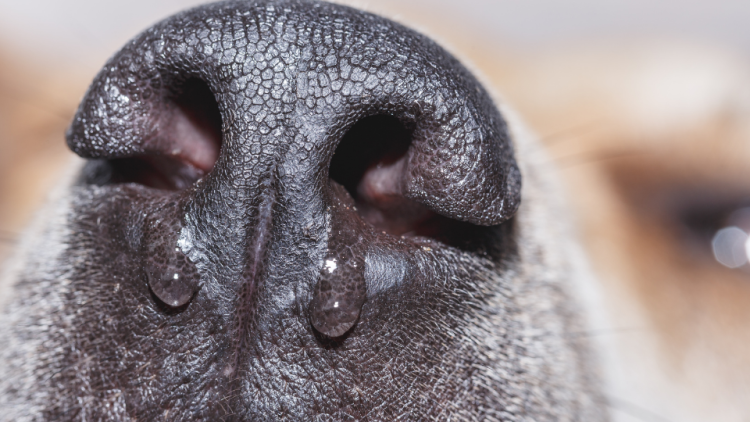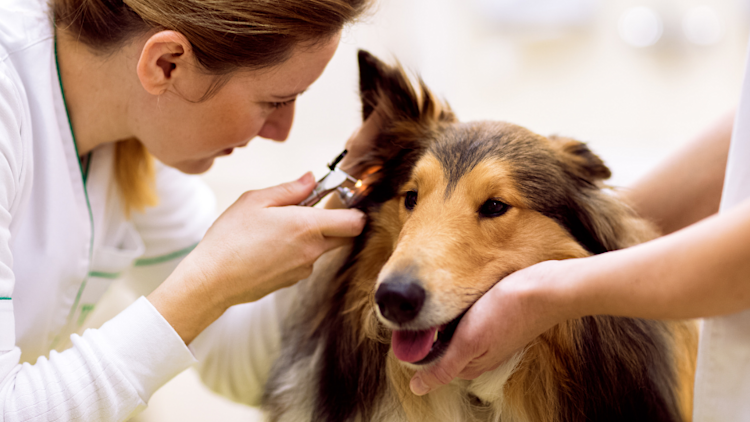It’s that time of the year again. Common colds are cropping up everywhere in people, but can dogs catch a cold or the flu, too?
If you’re wondering whether dogs can get sick from humans or by being out in cold weather, the short answer is yes. Keep reading to find out symptoms that may indicate your four-legged friend is feeling under the weather, plus tips on how to prevent and treat dogs with a cold.
Use the links below to jump ahead to the information you’re looking for:
- Can dogs catch human colds?
- Do dogs get cold symptoms?
- Common cold vs. kennel cough in dogs
- How to treat a dog with a cold
- How to prevent dogs from catching colds
- Can dogs get sick from humans?
- Final Thoughts
- Key Takeaways
Can dogs catch human colds?
When humans catch a cold, there are many potential viruses they might have caught (though more than half of cases are caused by rhinovirus1). We group these “cold” viruses together because they usually cause similar symptoms, like runny eyes and nose, sore throat, fatigue, and sneezing.
When it comes to dogs, there is not one recognized virus that has been identified as the common cold virus. However, there are several types of viruses that a dog may catch that causes them to exhibit cold-like symptoms. These viruses range in severity which is why it’s crucial that you pay close attention to any symptoms your dog may be experiencing.
Do dogs get cold symptoms?
So, what are the signs of a cold in dogs, and how can you identify if your dog has a cold that you can treat from home or if something more serious is going on?
Common dog cold symptoms:
- Runny nose with fluid discharge
- Frequent sniffles and wet sneezes
- Watery eyes
- Fatigue (extra naps, lower energy)
- Stuffy, congested breathing
Cold symptoms in dogs typically last between five and ten days. Colds can often be treated at home with some extra care from you.

Here are the recommended steps to help your dog recover from a common cold3:
- Isolate sick pets from healthy pets
- Allow your dog to rest as much as possible
- Give them plenty of water
- Place your dog in a room with a humidifier or leave them in the bathroom while you shower to expose them to warm humid air
- Wipe off discharge from their nose
If your dog is having trouble breathing, is extremely lethargic, shows signs of being in pain, or stops eating or drinking, take them to the veterinarian to be checked out. If your dog is ever inappetent, or respiratory symptoms worsen or increase in frequency, be sure to seek veterinary care. You should also seek veterinary care if you’re not seeing improvement each day.
Common cold vs. kennel cough in dogs
Kennel cough, also known as infectious tracheobronchitis, is a highly contagious disease that dogs can catch and is a more severe cause of cold-like symptoms in dogs.
Kennel cough targets the upper respiratory system and causes inflammation in the trachea. The infection usually has both a bacterial and viral component. can be caused by bacteria or a virus and is easily spread by dogs, thus the name kennel cough because many dogs get kennel cough after being exposed to other sick dogs. Kennel cough can even be picked up from an environment where infected dogs were.
Common signs of kennel cough in dogs include4:
- Mild fever
- Runny nose
- Dry, harsh coughing
- Watery eyes
- Decreased appetite
- Trouble breathing
- Nasal discharge
- Severe congestion
- Fatigue
Kennel cough’s most prominent symptom is usually dry, harsh coughing, which may end in retching or gagging. If you notice that your dog is experiencing a dry, harsh cough or they are retching or gagging, contact your vet as soon as possible. Antibiotics from the veterinarian can only help with the bacterial component; the viral component needs time and supportive care. Without treatment, kennel cough can become more serious, like pneumonia, and lead to severe complications or even death5.
How to treat a dog with a cold
If your dog is showing symptoms of a cold, reach out to your veterinarian so that they can perform a physical exam and rule out other possible causes. Your veterinarian may examine your dog’s heart and lungs, and perform other diagnostic tests to rule out other possible causes.
For example, dogs can experience cold-like symptoms resulting from parasitic infections, like roundworms and heartworms, as well as fungal infections. Coughing may be an indication of infection, so your veterinarian might want to check your dog for parasites to rule them out before proceeding with a treatment plan.
If your dog has kennel cough, the vet will likely prescribe antibiotics to fight the infection. They may also provide you with other medication, such as a cough suppressant. Regardless of the type of cold virus, your dog will likely need extra fluids, plenty of rest, and time to recover.

How to prevent dogs from catching colds
Some viruses that cause cold-like symptoms are preventable with canine vaccines. Currently, there are vaccinations available for kennel cough, canine influenza, and distemper viruses. Depending on your dog’s health and age, your veterinarian may recommend these core vaccines to help prevent disease.
Other ways you can protect your dog from catching cold viruses include limiting your dog’s time with other dogs, especially if you hear about dog disease outbreaks in your community, and avoiding socializing your dog until they are fully vaccinated. Regular checkups with your vet are also key to keeping your dog as healthy as possible with a strong immune system, which can help them fight off a cold virus if they get sick.
If you have multiple dogs in your household, we recommend keeping your sick dog away from other dogs until the virus has been identified and taken care of.
Can dogs get sick from humans?
Cases of zoonotic disease — meaning any disease or infection transmissible between pets and humans — are rare. Whether you have a cold or your dog has a cold, it’s unlikely that either of you will transmit the virus to the other because common “cold” viruses rarely transfer from one species to another species. So, if you have the sniffles and want to cuddle with your dog, rest easy knowing that your dog is at a very low risk of catching anything from you2.
Final Thoughts
If your dog is showing signs of a cold, consult with your veterinarian about your next steps. Depending on the severity of the symptoms, your vet may want you to bring your dog in for a check-up to rule out larger medical problems, like parasites and kennel cough.
Also note that older dogs can have symptoms of a cough that are actually from collapsing trachea or heart disease and are not viral/bacterial related. It’s important for pet parents to be aware that veterinary check-ups can be expensive, but they are extremely important to your dog’s health and happiness and should never be skipped.
Pet insurance reimburses you for up to 100% of out-of-pocket veterinary expenses so that you never have to hesitate to take your dog in for needed care. Don’t wait until your dog is sick. Look at personalized pet insurance plans today and compare top pet insurance providers side-by-side.
Key Takeaways
- Like us, dogs can get colds, but dog colds range in severity more, which is why pet parents should be vigilant about any symptoms their dog is experiencing.
- If your dog is retching, gagging, having trouble breathing, or uninterested in food or water, immediately take them to their veterinarian for treatment.
- Humans and dogs are unlikely to transmit colds to one another, but your dog may share their cold with other dogs in your household, so keep them separated while your dog recovers.
- Pet insurance can reimburse you for up to 100% of out-of-pocket veterinary expenses, ensuring you can always give your dog the best care possible.
References
- American Kennel Club, “Can Dogs Get Colds?,” Accessed Dec. 13, 2021.
- Animal Clinic of Woodruff, “When Pets Get The Sniffles,” Accessed Dec. 13, 2021.
- Palm City Animal Clinic, “5 Common Causes of Cold-Like Symptoms in Dogs,” Accessed Dec. 13, 2021.
- Reedy Creek Vet, “Can Dogs Get Colds?,” Accessed Dec. 13, 2021.
- American Kennel Club, “Distemper in Dogs,” Accessed Dec. 13, 2021.
- Southern Arizona Veterinary Speciality & Emergency Center, “Can Dogs Catch a Cold or Flu?,” Accessed Dec. 13, 2021.
